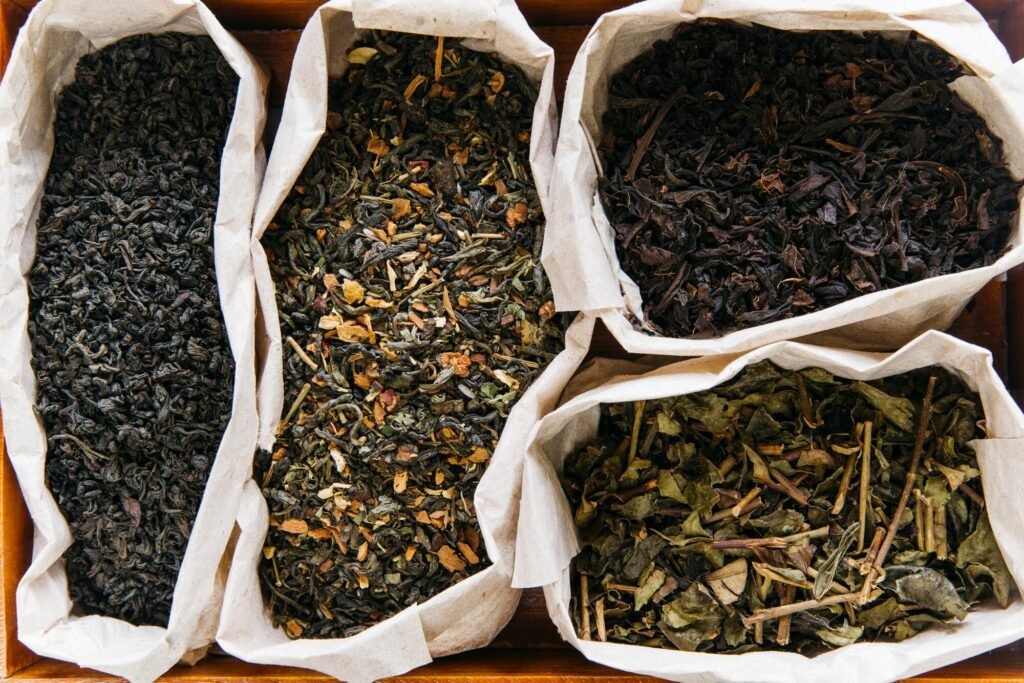Over the past period I have mainly shared a lot of recipes with you. Recipes with, how could it be otherwise, tea in the leading role. Today I wanted to cover a different topic. People around me regularly hear that tea tastes bitter or that they especially don’t like green tea because it is bitter. The question that follows is always; How is this possible? So time for a blog about making tea. It’s really not rocket science, but there are some basics. So-called move recommendations. Each tea has its own brewing advice and if you follow this you will make the tastiest tea.
I took over the Tea Brewery last year, but since the beginning we have included brewing advice with every bag of tea that leaves us. We do this by sticking a label on the bag with not only the ingredients but also the brewing advice.
General brewing advice
Let’s start with the more general brewing advice, what you DO and what NOT to do when you want to make a nice cup of tea. It may be unnecessary to say, but these brewing recommendations are of course based on good loose tea .
You have purchased a delicious loose tea or perhaps composed it yourself in our Brewery . Then store the tea in a dark place. I personally use airtight storage tins, which benefits your tea and also looks nice. You can store tea for a long time, but it does lose some flavor over time. True tea addicts won’t get a chance to do that, but if you only drink a cup of tea every now and then, an airtight storage tin like this is really a must-have.
In terms of quantity of tea, the rule is as follows: For a cup of tea approximately 2 grams of loose tea and for a pot of tea approximately 10-12 grams of tea. Should you grab a kitchen scale right away? No of course not! It can all be much easier. There are very handy dosing spoons for this, making it very easy to make the right amount of tea. Although this of course remains a matter of taste.
If you have a tea strainer or a handy tea squeezer , do not overfill it, but try to stick to 2 grams. Loose tea needs space so that the leaf can unfold to release its flavor. This of course also applies to the tea filters . For a pot of tea, use a larger filter so that the tea has room to release its flavor and color.
Tea, of course, consists largely of water. It is best to make tea with cold water. Cold water contains more oxygen and this brings out the taste of tea more.
Preheat your teapot with boiled water. This is so that the boiled water you use for tea does not lose its temperature too quickly.
As mentioned, each tea has its own brewing advice, so look at the bottom or back of the bag for our tea and try to follow it. Especially when it comes to temperature. The temperature and the time of steeping influence whether tea tastes bitter. With green tea, the temperature mainly has an influence; if it is too high, the tea can taste bitter. With white tea, for example, the steeping time has a major influence. If it is too long, the tea will taste bitter. And let’s face it, a bitter tea doesn’t make anyone happy.
Now I hear you thinking; very nice, but I don’t know yet how the tea can taste bitter. Why does tea become bitter? When you pour boiling hot water over the tea leaves, they burn and do not give off the intended taste but rather a bitter burnt taste. So not nice.
Another cause is letting the tea steep for too long. The longer the tea leaves are in the water, the more flavor they will release.
If hard water comes out of your tap, this can also have a negative impact on the taste. In that case, try making tea with spa water. I promise you that your tea will immediately taste a lot better.
If your tea tastes bad or bitter, it could also be the tea itself. Tea can be stored for a very long time (provided it is dark and airtight), but as mentioned, it does lose flavor over time. A bitter taste may then remain. All our tea has a ‘best before’ date. This means that the tea retains its flavor until that date. Provided it is properly stored, of course.
Or perhaps you used too much tea? Even then, too much flavor may have been absorbed into the water, resulting in a bitter taste.
And last but not least; FILTHY. How often do I come across kettles that are full of limescale and dirt… Maybe that nasty bitter taste doesn’t come from the tea at all but from something completely different (Yikes). Therefore, don’t forget to clean your kettle and teapot regularly.
Cleaning your teapot/kettle? Fill your kettle with 100 ml of vinegar and 400 ml of water and let it boil. Let it sit for half an hour, empty the kettle and rinse thoroughly with water. There you have it, your kettle is as good as new again and you can enjoy delicious cups of tea again!
| Type of tea | Temperature | Time |
| Black tea | 90 – 95 degrees | 2 – 3 minutes |
| White tea | 80 – 85 degrees | 2 – 3 minutes |
| Green tea | 70 – 75 degrees | 2 – 3 minutes |
| Rooibos/Honeybush | 95 – 100 degrees | 6 – 7 minutes |
| Fruit tea | 95 – 100 degrees | 8 – 10 minutes |
| Herbal tea | 95 – 100 degrees | 8 – 10 minutes |

